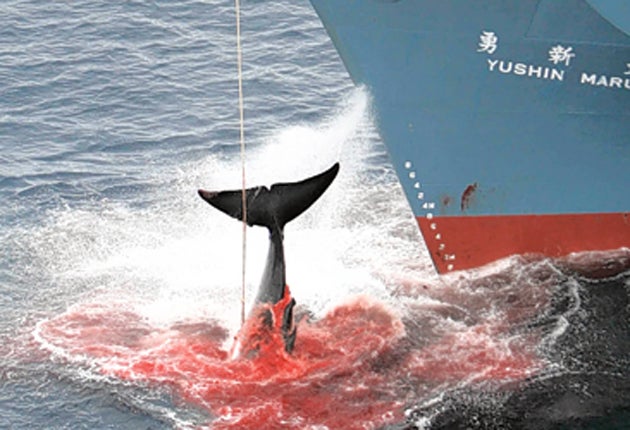Victory for anti-whaling campaigners

The controversial attempt to scrap the 24-year-old international moratorium on commercial whaling collapsed yesterday, to the delight of anti-whaling campaigners and the frustration of Japan, Norway and Iceland, the three countries which continue to hunt whales in defiance of world opinion.
Delegates from the 88 member states of the International Whaling Commission (IWC), meeting in Agadir, Morocco, were unable to reach agreement, after two days of talks behind closed doors, on the three-year-old proposal to abandon the official whaling ban in exchange for smaller, agreed kills by the whaling states. Britain was part of a European Union group that strongly opposed the plan.
The issue is now off the agenda for at least a year, until the next meeting of the IWC, but the result was greeted as a triumph by some environment groups who feared that the deal would put the future of the great whales in jeopardy once again.
"We have won the battle to keep the ban in place, but we must continue to fight to win the war on all whaling," said the chief executive of the Whale and Dolphin Conservation Society, Chris Butler-Stroud. "Yes, the moratorium still stands but we must not forget that Japan, Iceland and Norway continue to whale outside of the sanction of the IWC, and that is a situation that has to change. Their whaling activities must come to an end once and for all."
The leader of the British delegation at the talks, the Minister for the Marine Environment, Richard Benyon, said last night: "We in the UK have been consistently clear that any new agreement must reduce the numbers of whales that are killed each year with the aim of a complete phase-out of all commercial whaling. We could not support an agreement that did not have conservation at its heart."
However, the Japanese whaling commissioner Yasue Funayama, said her country had offered major concessions to reach a compromise and blamed anti-whaling countries that refused to accept the killing of a single animal. "We must rise above politics and engage in a broader perspective," she said.
The deal which failed yesterday was originally proposed by the United States, which was seeking agreement with Japan to secure whaling permissions for its Inuit native peoples in Alaska, without the Japanese making tit-fot-tat trouble because of American support for the moratorium – something which had happened in 2002.
It would have allowed commercial whaling to be legitimised once again for a period of 10 years, with official IWC "quotas" set for the number of whales which each country would catch.
The sweetener of the deal was that these numbers would supposedly be lower than the number of whales actually being killed by Japan, Norway and Iceland outside the IWC, a figure currently running at about 1,500 a year, so in the end whales as a whole would benefit.
But no quotas had actually been agreed, and many of the anti-whaling countries thought such a deal would be virtually impossible to police, besides opening up commercial whaling to potential new participants, such as South Korea.
Join our commenting forum
Join thought-provoking conversations, follow other Independent readers and see their replies
Comments
Bookmark popover
Removed from bookmarks